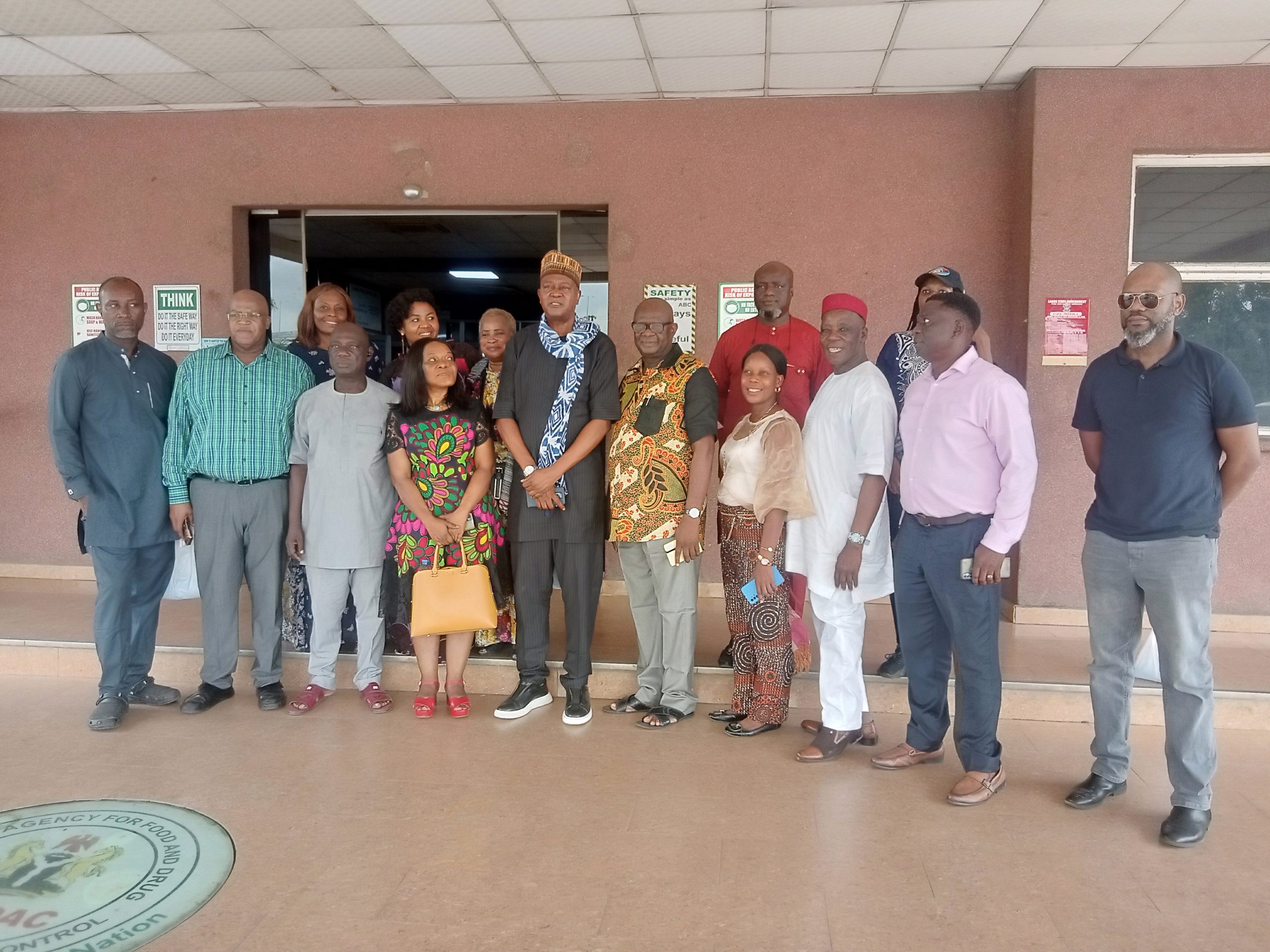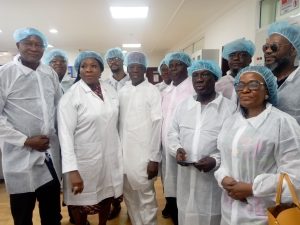
As part of efforts to take Nigeria from the fifth to first exporting country in Africa and ensuring its agricultural produce and products are not rejected abroad, the Aviation Cargo Roadmap Committee visited some testing laboratories in the country.
The objective of the facility tour is to understand the export process and the journey of the produce/product from the farm to the aircraft, which will help in the formulation of an all-encompassing document to drive the sector forward.
The facilities visited are: Katchey Laboratories Limited, Ikeja, National Agency for Food and Drug Administration and Control (NAFDAC) Central Laboratory Complex, Oshodi, and the Nigeria Agriculture Quarantine Service (NAQS) packhouse at the Murtala Mohammed International Airport (MMIA), Lagos.
The committee’s coordinator, Mr. Ikechi Uko, organiser of the CHINET Aviacargo Conference stated that part of why the government set up the team is to find solutions to the problems bedeviling the sector, as well as to improve and instill standards.
He bemoaned the low acceptability of Nigeria’s farm produce abroad, despite being a leader in the production of so many commodities with available markets, adding that Nigeria wants to be the number one exporting African country in the next three years.

His words: “Nigeria is the biggest economy with the largest population, but it is number five in aviacargo in Africa. kenya is number one even though it doesn’t have the largest economy, population, airlines or airport. What are they doing right in Kenya? So we are trying to understand why we are number five, why we should be number one, and how to get there. We want to be number one in the next three years.
“We’ve done the airport assessment, we’ve seen NAHCO, SAHCO, and the cargo processes. Aside the logistics problems, there are issues with the products/produce, one of which is rejection abroad and ban from exportion of many things.
“The journey of the produce from the farm to the table has to pass through some places and we found out that there is a gap, which is in the labs, as the products need to pass through a lab. So, where are the labs that are supposed to certify them? Why do we have to take our products to Ghana to export? We decided to find out what the labs actually do, in order to institute them as part of the report we will give to the government, stating the necessity.
“NAFDAC, SON, NAQS have labs, so why are the products still being rejected? We decided to also come to a private lab (Katchey) to understand what you do here, and how it can be a major part of the template for export. We are number one in the production of so many products, but we don’t export any. The mango season is on and most of them are going to get rotten, but Mali is exporting tonnes of mangoes. What’s the difference? What are they doing that we aren’t?
“I hear stories of how they are looking for Nigerian snails in China, hibiscus in America, African Rosewood plant (oha) and many others, but we can’t send. We need to be able to organise it in a way that there is a flow path. Part of our result will be to create that flow path – that exporters need lab certifications and other things to get their products out there”.
Kate Isa, the Chief Executive Officer of Katchey Laboratories, an ISO/IEC 17025 ANSI National Accreditation Board (ANAB) approved facility, pointed out the far-reaching implications of not exporting acceptable products to the country’s economy.
According to her, concerned regulatory agencies should set standards and make sure farmers and their farms are accredited before they can grow produce for export, adding that those who run foul of the rules should be delisted.
Mrs. Isa explained that for the country to achieve the desired results, everyone involved in the system must not compromise and adhere to these standards in order to come up with wholesome produce/products.
She said: “November last year when fidelity took a team out to try and find export market for Nigeria, I spoke with Wanis, a leading UK food distribution chain and they told me that they used to import a lot of things from Nigeria. They will pay the supplier and when the containers get to the port in London, it will be held there, no matter the certificate that accompanied it, until they run their own test. If it passes, then they let it go.
“The company had to pay demurrage and for the UK test. Because this was increasing their cost, they stopped buying from Nigeria. Instead, they went to Ghana, Benin Republic and other parts of Africa where things work, because the African market is booming”.
While noting the importance of what the committe is doing, she stated that Katchey is passionate about making Nigeria the African export hub with zero product rejection, using cutting-edge technology.
“We saw the gap in the African continental trade, that there is nobody in the private analytical lab sector and want to exploit it. If we are not prepared and ready, we (Nigeria) will miss that opportunity, seeing that Nigeria’s oil production has further fallen, according to OPEC.
“What the committe is doing is very important and urgent to make sure we can export and there are no rejections. Because if we don’t export, then we are finished. There is no oil; we have to export, and without rejection.
“Exporters must ensure that their produce are up to the required standard. When the customer tells us the country of destination, we analyse and compare with the specification of that country. If it doesn’t meet their standard, then we let you know it cannot go, so that when we eventually certify your product, it won’t be rejected”.
She advised that Nigerian agro product exporters must have dedicated vehicles that only handles food produce and not mix them with other goods to avoid contamination.
Oh his part, Dr. Charles Nwachukwu in charge of the NAFDAC Central Lab said that the DG of the agency is seriously concerned about the rejection of Nigerian commodities abroad.
He pointed out that most farmers and exporters knowingly try to cut corners in order to make more profit, which then backfires, causing damage to the country’s reputation.
“There have been a lot of enlightenment campaign and most choose not to be aware and try to beat the system. Then when the products get abroad, it is rejected when tested and found not to meet the standard set.
“The reason our commodities are taken to Ghana is for it not to be labelled Nigerian products. Our exporters should know what is required from the country of destination and make sure it is met. Ngerians should learn to follow due process, as they will make more money, and the country’s name will be restored”.
He advocated that extension workers in the Ministry of Agriculture should do the needful by educating the farmers on how to eliminate most of these issues right from the farm, since most of the products are agricultural based.
He explained further: “For example, if you are exporting maize, and the aflatoxin level of maize required in Europe is 0.4ppm, the agricultural extention workers can assist the farmers to know when to harvest and the appropriate storage process. The quality of the produce coming out of our farms lies in the hands of extension workers in the federal, state and local government levels.

“Another issue arises from preservation. In the bid to protect their investments, some use pesticides and other chemicals which is wrong, causing rejections. We have been sensitising our people on the implication of this action, and we will continue to do so. Sometimes they use preservatives higher than what is required and that is the cause of the reject. It has been pesticide residue and mycotoxin level mainly that has been causing the rejects”.
On the level of credibility and global acceptance of NAFDAC’s certificate, he said that talks of the agency’s certificate being rejected abroad is false, as its labs and scope of analysis are accredited to ISO 17025 – 2017, which is the current version.
“There is no where in the world where they will reject the certificate issued by NAFDAC. There was no time this happened, because we have one of the best lab in Africa. NAFDAC has about seven labs and five of them are concerned with food. The Oshodi Lab is the centre of excellence. We have some of the best facilities when we talk about lab quality and we are improving on the equipments that are available”, he said.
Speaking on the role of NAFDAC in improving Nigeria’s position in aviacargo business in Africa, Nwachukwu disclosed that the agency offers lab services for export of agricultural produce free of charge if it passes through the proper channel and process, which is the export desk of the Port Inspection Directorate (PID).
He added that NAFDAC is ready to partner with other agencies to grow the export and health system, and is currently working with NAQS to sreamline the export of agricultural commodities and finished products, in order to issue the various required certification.
Dr. Favour Ubiagoro, head of the NAQS Pack house, MMIA, said that the agency accredits farms and assign officers to monitor their activities, and also inspects harvests to check for toxin level and condemn produce that do not meet the requirements for export.
Ubiagoro who disclosed that the NAQS also engages experts to help train farmers and enlighten exporters, called for an umbrella standard covering all agricultural produce, and the need for agriculture extension workers to educate farmers on new techniques regularly.

She however, stated that delays caused by ground handling companies and other government agencies during inspection affects the perishable farm produce such as vegetables before they leave the country.
Ubiagoro further disclosed that the agency is looking to introduce seals for boxes to protect already inspected commodities, which will be done in the presence of security agencies to eliminate time wastage. This will also stop exporters from adding other products not declared after leaving NAQS premises, adding that those caught in the past were penalised.
The veterinary epidemiology and toxicology expert said that the NAQS is currently experiencing shortage of staff, labs and adequate office space to carry out its statutory duty effectively.
To mitigate some of these challenges and contribute towards making Nigeria the number one exporting country in the continent, she said it is partnering with SON and NAFDAC to use their facilities for testing, while recruitment and training is ongoing to increase the staff strength.











